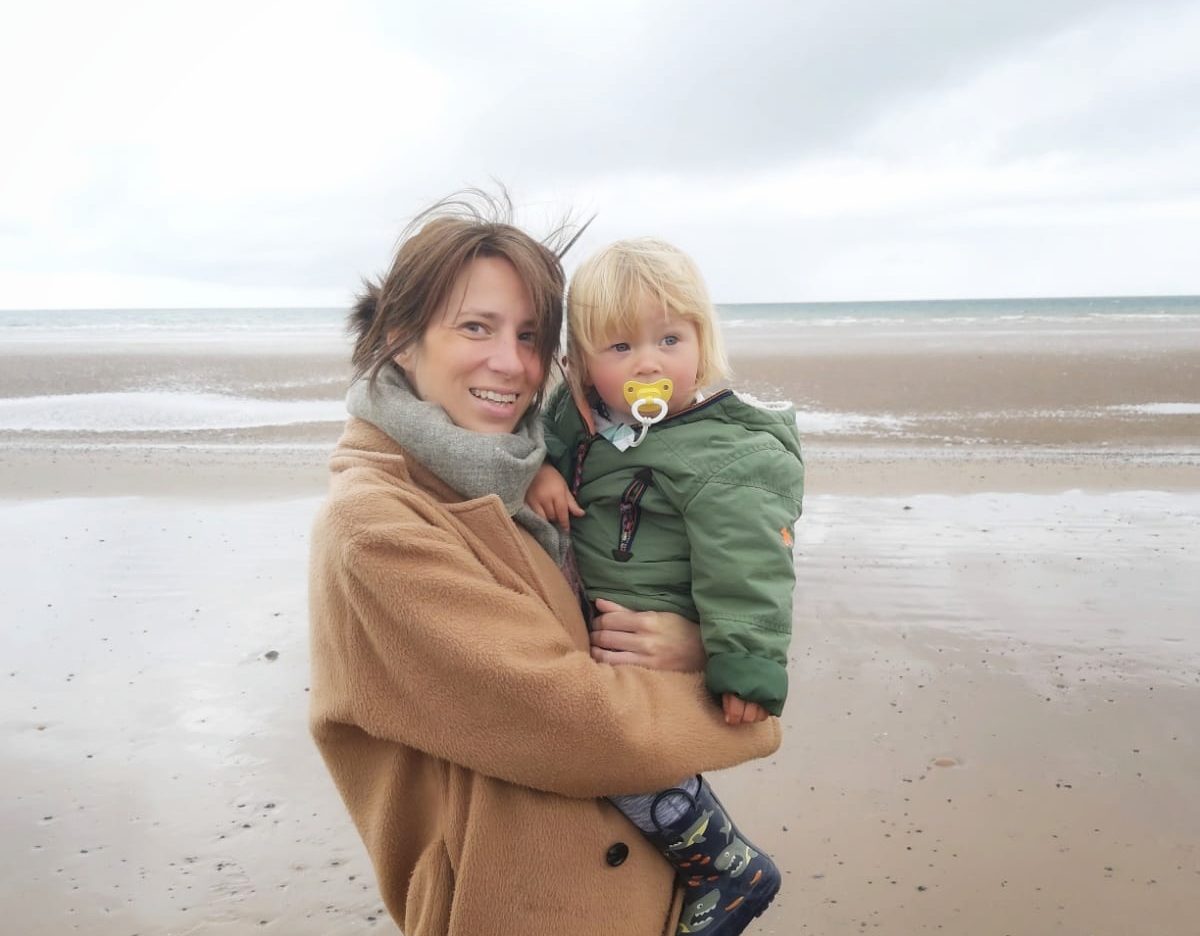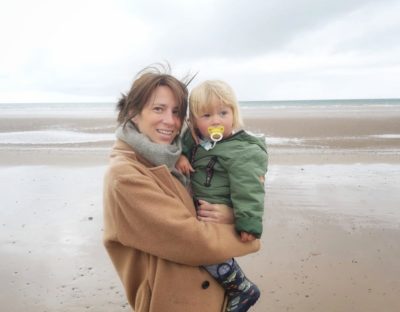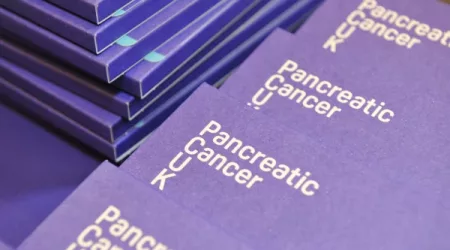



Sammi
Sammi was 34 when she was diagnosed, and pregnant with her first child. She talks about getting a second opinion, having treatment with chemotherapy, Nanoknife® and the Whipple’s procedure, and reflects on her journey.
I became pregnant with our first baby in 2019. I started to feel breathless quite early on in pregnancy, which I thought was unusual as I was relatively fit. Later on in my pregnancy this became worse, with extreme pains starting in my lower back and abdomen which would wake me up at night in floods of tears.
I started to visit my GP with these complaints at the beginning of November 2019. At first my pains were put down to the pregnancy. It was then thought I had a blood clot, for which I was sent to the local hospital for further investigations, which resulted in me being sent home. It was then thought the pain could be related to pleurisy or something muscular. Again I was sent to the local hospital for various tests, all resulting in me being sent home.
Eventually they conducted an ultrasound, which showed possible gallstones for which I was admitted to hospital, where I underwent further tests.
By this time I had become jaundiced. I was in hospital for a month over Christmas and New Year, where I had a stent fitted under general anaesthetic to stop the jaundice. During this time I had to also sign consent for an emergency C-section should something go wrong during the procedure.
Different opinions – and meeting my son
It was then suspected that I had a mass on my pancreas, but I was told this was most likely benign (not cancerous) due to my young age. My notes were sent to the specialist centre and it was agreed they would induce me early so that I could have the proper scans and a biopsy to check the mass.
I was induced a month early, and diagnosed with pancreatic cancer on 28th January 2020, the same day they gave me my baby boy. He had spent the first week of his life in intensive care for support with his breathing due to having come early. I remember the nurses coming in and taking him from us, so that me and my husband had some time to process the information that it was cancer. It was the worst moment of my life. They then sent us all straight home. We had our first night together as a little family, then contacted our parents the next morning and told them.
I was referred to the specialist centre again for further support, where I was told that I should never have been given a cancer diagnosis without a biopsy. As I did not fit the profile for pancreatic cancer, they were confident it was not cancer but perhaps an auto-immune problem or pancreatitis.
I had to have further tests and a number of hospital admissions due to infections with my stent. All of this meant time away from my baby. I was only able to feed him for a week as I was put on pain medication, which meant I could no longer breast feed. It was very upsetting as I was already feeling like I was failing him.
Finally, I was told it was in fact cancer and that it was inoperable due to portal vein involvement. I felt numb. I felt that I was a failure – that I was letting my son and my husband down. I was scared of leaving my son who will have no memory of me, and my husband. I was scared of dying and of pain. I was overwhelmed. Exhausted. A whole array of emotions.
Starting chemotherapy
I was started on FOLFIRINOX, which I was told was the ‘gold standard’ in chemo for pancreatic cancer. They were trying to shrink my cancer, aiming to make it possible to operate. Following the first cycle, there was a small amount of shrinkage to the tumour, but not enough to make me operable.
I had horrendous side effects from the first line chemotherapy. I had awful sickness and diarrhoea. I had hair loss, neuropathy, loss of appetite and lost a total of 3 stone overall, with extreme fatigue. Due to the severe side effects I experienced, my oncologist decided to reduce the dose by 25% for my second cycle.
Following this, I had severe pain in my back. It took them a while to get on top of the sickness and pain I was experiencing. I was put on a syringe driver for a month at one point.
I was worried about the cancer growing at this point, but was told that it did not ‘sound like’ cancer pain and was advised to carry on until the end of the cycle before having my scan.
My second scan showed that I was right: the chemo was no longer working and the tumour had grown. I was told at this point that I would never be operable and that ‘no other surgeon would look at me’ due to the positioning of the tumour.
They said that the best advice they could offer was to spend as much time as I could with my son.
Keeping going and getting a second opinion
I was not ready to accept this, and so started on my second line chemotherapy treatment, which was gemcitabine. The side effects on the gemcitabine were not as severe, the diarrhoea however continued, as did the fatigue and nausea.
I was informed that gemcitabine was not as strong as FOLFIRINOX. Following my first cycle of that, the scans showed that things were ‘stable’ which was the best I thought I could hope for at that time.
Throughout this time I was speaking to Pancreatic Cancer UK’s Specialist Nurse Lisa, who offered invaluable support. She found a number of potential options I could explore, including a form of radiotherapy which unfortunately I was not suitable for. Then she suggested Nanoknife®.
Hope
I was given the details of a surgeon who offered this, and contacted them immediately after being told I was inoperable. I initially did this privately to get seen sooner. From the first consultation I felt hope for the first time in a long time.
Although they weren’t offering to do Nanoknife® at that point, they said that they would reconsider following more chemotherapy, with the hope of some reduction in the size of the tumour. In the end, although there was no reduction, the tumour remained stable and they agreed to review my case in their multidisciplinary team.
I was informed soon after that they would operate. They said that they would not only complete Nanoknife®, but would also consider a Whipple. I was told that they wouldn’t know until they were inside me as to whether the Whipple was possible or not.
I had a lot of contact with my surgeon in the lead up to this. He was so wonderfully communicative and compassionate, whilst remaining realistic and managing my expectations.
Thankfully, they were able not only to do Nanoknife®, but this also allowed them to complete a full Whipple, with clear margins. Nanoknife® and my surgeon saved my life.
Reflecting on my story
I have struggled my way through the last 18 months. Cancer took away the beauty in being pregnant for me and took away my ability to be a mother to my son. I was so ill at points I was unable to care for him the way you hope and dream of being with your first child.
I fought hard for him and my husband and family. There were days I wanted to give up. I couldn’t bear the thought of living out my last few months in pain and having family watch me deteriorate in front of them. Mentally it has been very difficult.
I am lucky to have such a fantastic support network. Luckily our parents are retired and so could be part of our support bubble during COVID to help with our son when I was in treatment.
I found a lot of support through Pancreatic Cancer UK. The PCUK Specialist Nurses offered me options that weren’t brought to my attention by my local team and helped me to make sense of my symptoms and push for certain tests and medications, which made so much difference to my quality of life. I still have fatigue and some issues with my bowels, but I hope over time they will improve.
I am now 5 months post-Whipple and getting stronger every day. I am slowly starting to put on weight and spending more and more time with my son, making memories. I am still scared of what the future holds, despite my clear margins. I fear the cancer will return as I know it often comes back. But I try to live every day as it comes and be grateful for the life, the second chance I have been given.
I would always encourage people to get a second opinion. Don’t give up! And explore Nanoknife®; there are not a lot of places that do this in the UK and more people need to be aware of it. It could save your life.




